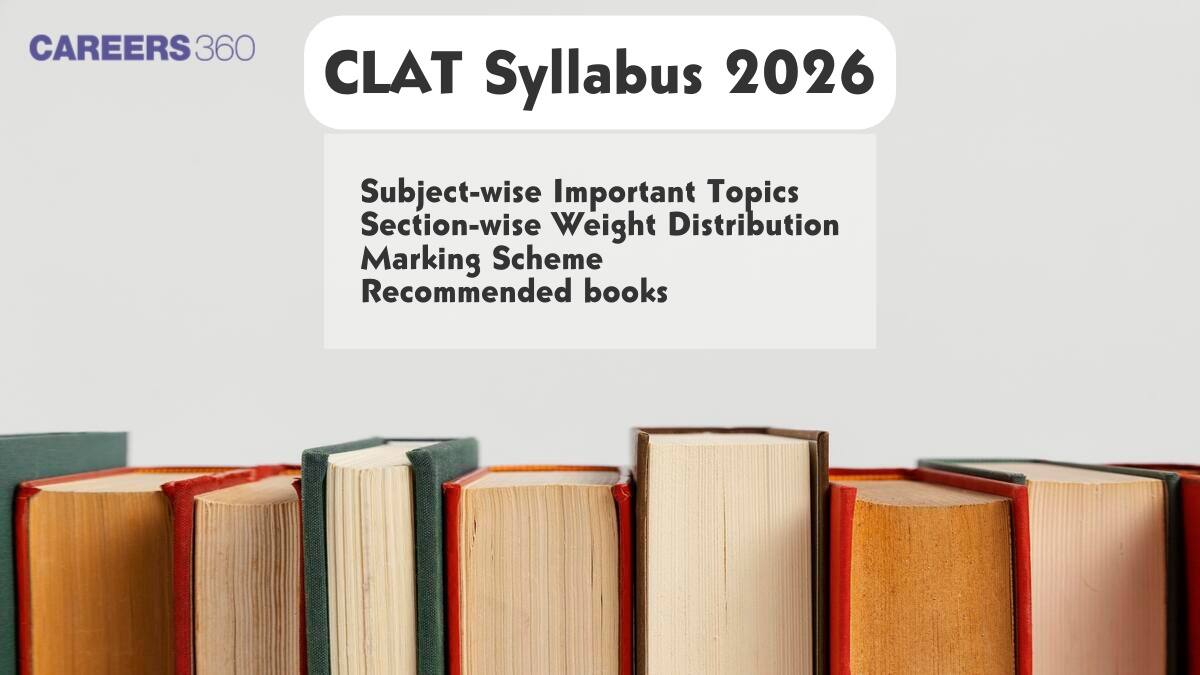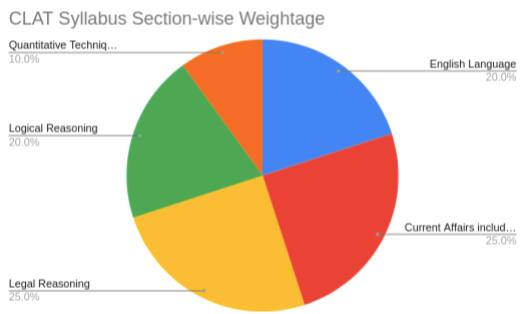UPES Integrated LLB Admissions 2025
Ranked #28 amongst Institutions in India by NIRF | Ranked #1 in India for Academic Reputation by QS Rankings | 16.6 LPA Highest CTC
CLAT Syllabus 2026: The Consortium of National Law Universities (NLUs) has notified the CLAT 2026 syllabus on its official website - consortiumofnlus.ac.in. The CLAT UG 2026 syllabus has five sections namely English language, logical reasoning, legal reasoning, general knowledge, current affairs, and quantitative techniques. The maximum difficulty level of the syllabus of CLAT 2026 is of class 12th level. On the other hand, the CLAT LLM syllabus 2026 covers different law topics, testing the candidate's suitability to pursue post-graduation in law. Read the complete article about the CLAT syllabus 2026, including subject-wise topics, marking scheme, and more. The Common Law Admission Test is a reading-intensive law entrance exam. A common skill tested in the CLAT 2026 syllabus across all the syllabus is the ability to read and comprehend long text passages. The CLAT question papers often require students to read around 20,000 words across passages and answer the questions within 120 minutes.

As per the CLAT 2026 eligibility criteria, candidates who have passed Class 12 or equivalent with a minimum of 45% marks for the general category and 40% marks for SC, ST, PwD are eligible to apply and appear.
As per the CLAT exam pattern, the total number of questions in CLAT 2026 will be 120, each carrying one mark, spread across the five sections as per the assigned weights. Candidates will have 2 hours to answer the questions. The CLAT participating institutes include 24 national law universities (NLUs), 1 private university, and 60+ affiliated colleges that accept CLAT scores for their law admissions. CLAT 2026 will be conducted on December 7, 2025 offline for 5-year LLB and LLM admissions.
| Details | Particulars |
|---|---|
Exam name | Common Law Admission Test |
Duration of CLAT exam | 2 hours (offline exam) |
CLAT exam timings | 2 pm to 4 pm |
Total number of questions in CLAT 2026 | 120 |
Subjects | Legal reasoning, logical reasoning, maths, current affairs, general knowledge and English comprehension |
Level of difficulty | Class 12 or equivalent |
Whether the CLAT 2026 syllabus is tough or not can be gauged by the success rate in CLAT. Close to 60000+ candidates appear for the exam every year vying for very limited number of seats in the top NLUs. The table below provides the success rate in CLAT.
Exam | Number of registered candidates | Number of appeared candidates | Attendance | Seats | Maximum Success Rate |
|---|---|---|---|---|---|
CLAT UG | 62832 | 60544 | 96.35% | 4054 | 6.66% |
CLAT PG | 16082 | 14817 | 92.91% | 1591 | 10.73% |
Ranked #28 amongst Institutions in India by NIRF | Ranked #1 in India for Academic Reputation by QS Rankings | 16.6 LPA Highest CTC
Ranked 1 st among Top Law Schools of super Excellence in India - GHRDC | NAAC A+ Accredited | #36 by NIRF
There are five sections in the CLAT 2026 exam syllabus. Each section contains comprehension passages followed by a series of multiple-choice questions. Candidates are required to answer the CLAT questions after reading the passages. The subject-wise distribution of questions and marks is given below.
| Subject name | Number of questions | Marks |
|---|---|---|
English Language | 22-26 | 22-26 |
Current Affairs including General Knowledge | 28-32 | 28-32 |
Legal Reasoning | 28-32 | 28-32 |
Logical Reasoning | 22-26 | 22-26 |
Quantitative Techniques | 10-14 | 22-26 |
Total | 120 | 120 |

There are five subjects in CLAT. As can be seen in the overview above, the CLAT 2026 subjects have different weights in the syllabus. Among the CLAT exam subjects, current affairs and legal reasoning have the maximum weight at 25%. English and logical reasoning have 20% weightage. The lowest weight among the CLAT subjects is for Mathematics at 10%. The CLAT subject-wise marks are also distributed according to the weight of each subject.
| Sl. no | Sections | Weightage |
|---|---|---|
| 1 | Current affairs | 25% |
| 2 | Legal reasoning | 25% |
| 3 | English | 20% |
| 4 | Logical reasoning | 20% |
| 5 | Quantitative techniques | 10% |
The CLAT 2026 syllabus is designed to test whether the candidates possess the basic skills and aptitude required to pursue a career in law. The five subjects of the CLAT UG syllabus 2026 test some common and some subject-specific skills. The common skills tested in the CLAT syllabus are those personality traits that will be required for anyone interested in pursuing the legal profession. Such skills include critical thinking and analytical skills. The subject-specific skills tested in the CLAT syllabus are different for each subject. Let's do the section-wise breakdown of the CLAT syllabus in depth.
The CLAT English section is primarily a test of a candidate’s language skills — reading, comprehension, and grammar. The English syllabus for CLAT 2026 will contain 3-4 passages of around 450 words each. Each passage is followed by multiple-choice type questions based on the passage. Students have to read the passages and answer the underlying questions accordingly. The passages are usually drawn from non-fiction and journalistic sources such as newspapers and magazines.
Particulars | Important details |
|---|---|
Total weightage | 20% |
Type of questions asked | Comprehension-type passage-based questions |
| Number of questions | 22-26 |
| Number of passages | 3-4 passages of around 450 words |
Source material or content of passages | Newspapers, journals, contemporary or historically important fiction and non-fiction writing. |
Standard of questions | 12th standard |
| Skills Tested |
|
| Important Topics |
|
| Preparation tips for English |
|
This section will have 25% of the questions, making the GK and current affairs syllabus for CLAT 2026 one of the most important sections in the question paper. The CLAT general knowledge largely remains static and tests the basic knowledge of candidates in subjects such as history, economics, political science, and technology. Whereas, CLAT current affairs will be based on topics of national and international importance that have been featured in recent news. However, in recent years, questions for CLAT GK and current affairs have been asked based on the information given in the passage itself. The table given below provides an overview of the CLAT GK syllabus 2026.
| Particulars | Important details |
|---|---|
Total weightage | 25% |
Type of questions asked | Comprehension-type passage-based questions - Static general knowledge and current affairs |
| Number of questions | 28-32 |
| Number of passages | 4-6 |
Source material or content of passages | News, journalistic sources, and non-fiction writing. |
Standard of questions | Class 12th |
| Skills Tested |
|
| Important topics |
|
| Preparation tips for GK |
|
You may also check - CLAT Exam Date
The legal reasoning for CLAT 2026 has a 25% weight in the CLAT syllabus. The consortium of NLUs specifies that prior knowledge of the law is not required for the legal reasoning syllabus for CLAT 2026. However, CLAT experts suggest that some level of familiarity with basic legal principles and current legal affairs will help candidates answer questions quickly and perform better in the exam. Knowledge of legal and moral issues can help candidates apply general legal principles and propositions in various fact scenarios when attempting the CLAT legal reasoning questions.
There will be 4-6 passages in the CLAT legal reasoning syllabus of 450 words. These passages will contain various fact situations or scenarios with legal matters, public policy questions, or moral philosophical inquiries. The CLAT legal reasoning questions will be based on the given passages. The passages are drawn from non-fictional sources such as policy reports and legal journals.
Particulars | Important details |
|---|---|
Total weightage | 25% |
Type of questions asked | Multiple-choice type questions from comprehension passages |
| No. of questions | 28-32 |
| No. of passages | 4-6 |
Source material or content of passages | Legal knowledge, policy reports, legal journals, cases, news and editorials |
Difficulty level | Class 12th |
| Skills tested |
|
| Important topics |
|
| Preparation tips for legal reasoning |
|
The CLAT logical reasoning syllabus has a 20% weightage in the CLAT syllabus 2026. The section on CLAT logical reasoning attempts to test the ability of candidates to think logically. The questions in CLAT logical reasoning are based on passages that contain statements, arguments, and facts. The language and tone of the passages can be tricky with the use of words like “And/Or, Where/There, All/Some” etc. Additionally, this section will have arguments and patterns in which candidates have to either draw relationships or apply those arguments in different situations.
| Particulars | Important details |
|---|---|
Total weightage | 20% |
Type of questions asked | MCQs from comprehension passages |
| Number of questions | 22-26 questions |
| Number of passages | 3-4 |
Content of passages | Arguments, patterns, statements, and fact situations |
Difficulty level | Class 12th |
| Skills tested |
|
| Important topics |
|
| Preparation tips for logical reasoning |
|
The CLAT Maths syllabus carries 10% weightage in the CLAT 2026 syllabus. The maths section carries the least weight in CLAT 2026. However, it is often considered a game changer as one can get ahead of the rest by performing well in this section which can be difficult for candidates from a non-mathematical background. The difficulty level of CLAT syllabus for quantitative techniques will be a maximum of class 10 level.
Unlike general maths, CLAT maths will not have straightforward problems. Questions in CLAT maths will be framed based on facts, conditions, data, graphs or textual representations containing numerical information. Candidates have to study that information before answering the underlying questions. Gathering and processing such numerical information may take some time, but the skills tested are only basic to mathematics. Students from the science stream may have a slight advantage in the CLAT maths section. However, the questions are basic, and students from other streams can improve their overall CLAT 2026 score by preparing well for the CLAT maths syllabus 2026.
| Particulars | Important details |
|---|---|
Total weightage | 10% |
Type of questions asked | Sets of facts or propositions, graphs, or other textual, pictorial, or diagrammatic representations of numerical information, followed by a series of questions. |
| Number of questions | 10-14 |
| Number of passages | 2-3 |
Standard of questions | Class 10th |
| Skills tested |
|
| Important topics |
|
| Preparation tips for quantitative techniques |
|
You may also check popular Law courses :
| Cyber Law | Criminal Law |
| Environmental Law | Family Law |
| IP and Technology Law | Company Law |
| Labour Law | Immigration Law |
| Taxation Law | Insurance Law |
Along with the syllabus, it is very important that candidates are acquainted with the paper pattern. CLAT 2026 will be an offline exam. As per the CLAT 2026 exam pattern, there will be 120 questions across five subjects. Candidates will be awarded one mark for every correct answer, and 0.25 marks will be deducted for every incorrect response. The detailed exam pattern of CLAT 2026 has been given below:
| Category | Details |
|---|---|
Time duration | 2 hours |
Mode | Offline mode (pen paper-based mode) |
Conducting Body | Consortium of National Law Universities (CNLU) |
Type of questions | Objective-type questions |
Number of questions | CLAT UG - 120 questions CLAT PG - 120 questions |
CLAT Total marks | 120 marks (Both CLAT UG and CLAT PG) |
CLAT UG marking scheme | Correct answer - 1 mark Incorrect answer - 0.25 marks deduction Un-attempted questions - No negative marking |
Language | English |
Analysing the previous year's CLAT question paper will help candidates evaluate the difficulty level of the CLAT syllabus 2026. The table given below provides the CLAT exam analysis of last year's CLAT question paper, including the difficulty level and the topics covered.
| Subject | Difficulty Level | Topics | Good Attempts |
|---|---|---|---|
| Current Affairs and GK | Easy | Article 370, Civil Obedience, Shakti Scheme, Olympics | Good Attempts - 105+ Safe Attempts - 110+ |
| Logical Reasoning | Easy to Moderate | Analytical Reasoning | |
| Legal Reasoning | Easy | Less core legal reasoning questions, Valid and Invalid Contract, Right to Privacy, 42nd Amendment | |
| Quantitative Techniques | Easy to Moderate | Dearness Allowance | |
| English Language | Easy | How to Improve Your Life passage by George Orwell |
The difficult sections in the CLAT syllabus vary as per the difficulty level of the exam. Last year's exam analysis shows that quantitative aptitude and logical reasoning were considered moderate, while the remaining sections were considered easy. The maths section in the CLAT exam syllabus can be challenging for students from non-mathematical background. However, the difficulty level of the maths questions is not beyond class 10.
As mentioned above, the CLAT 2026 PG syllabus contains subjects of the LLB programme. The questions are asked in similar comprehension passage formats. However, questions are framed around specific law topics and current legal affairs. All of the questions asked in CLAT LLM 2026 will be objective-type questions. There will be no essay or descriptive section. The topics covered in the CLAT PG syllabus are listed below.
Law of Torts | |
Administrative law | Criminal Law |
Property law | Public international law |
Company law | |
Intellectual Property Law | International Law |
Tax law | Law of Contracts |
You may also check popular Nlus Admission details :
| DSNLU Visakhapatnam Admissions |
| NLUJA Guwahati Admissions |
| CNLU Patna Admissions |
| HNLU Raipur Admissions |
| DBRANLU Sonipat Admissions |
The difficulty level of the CLAT syllabus 2026 can be better understood when looked at in comparison to a few other law entrance exams. The table given below provides a comparison of the syllabus of CLAT 2026 with two other popular law entrance exams, namely AILET and SLAT.
| Particulars | CLAT 2026 syllabus | AILET 2026 syllabus | SLAT 2026 syllabus |
|---|---|---|---|
| Number of sections | 5 | 3 | 5 |
| Sections | English, GK and current affairs, legal reasoning, logical reasoning, quantitative techniques | English, current affairs and GK, logical reasoning | Logical reasoning, legal reasoning, analytical reasoning, reading comprehension, GK and current affairs |
| Number of questions | 120 | 150 | 60 |
| Time | 2 hours | 2 hours | 1 hour |
| Total marks | 120 | 150 | 60 |
| Marks per question | 1 mark | 1 mark | 1 mark |
| Negative marking | 0.25 mark for every wrong answer | 0.25 mark for every wrong answer | No negative marking |
| Number of attempts | Once a year | Once a year | Twice a year |
While preparing for the law entrance exam, candidates must refer to the standard CLAT books that are only meant for the entrance exam. Additionally, a daily English newspaper like The Hindu and internet-based study resources, news analysis, editorials, and journals are required for CLAT preparation. Here is a complete list of CLAT books and study materials that students should keep for their preparation.
Subject | Author |
|---|---|
Legal Reasoning |
|
General Awareness, Current affairs |
|
Logical Reasoning |
|
English |
|
| Quantitative Techniques | Class 10 textbook by NCERT Quantitative Aptitude by RS Aggarwal |
Previous Year Papers | Previous Year Papers by A.P. Bhardwaj |
Additional Resources | Newspaper - The Hindu or The Indian Express, legal journals, articles, editorials, explanations |
FREE CLAT Study Material - Download PDF
CLAT Mock Test with Solutions - 10 Free Mock Tests by Careers360 |
100+ CLAT Quantitative Techniques Questions with Answers and Detailed Solutions by Careers360 |
CLAT is one of the toughest law entrance exams in India and is highly competitive. Close to 60000+ students appear for the exam. Most of the sections in CLAT 2026 focus on high-level reading and comprehension skills which can not be developed overnight. Given below are the tips to prepare for the CLAT syllabus 2026.
The last-minute preparation for the CLAT 2026 syllabus requires slight tweaking. Candidates should focus more on consolidating one's learning than learning about new topics. Here are a few last-minute preparation tips for the syllabus of CLAT 2026.
Also, check:
The CLAT 2026 syllabus comprises five subjects - English Language, Current Affairs including General Knowledge, Legal Reasoning, Logical Reasoning and Quantitative Techniques.
CLAT UG exam comprises of five subjects - English Language, Current Affairs including General Knowledge, Legal Reasoning, Logical Reasoning and Quantitative Techniques.
Candidates can check the detailed CLAT syllabus in this article. The article comprises detailed subjects and topics list.
The Consortium of NLUs prescribes the syllabus of CLAT 2026.
No, there are no new changes in the CLAT 2026 syllabus.
Yes, English Language and Logical Reasoning sections have a weightage of 20% each, while Current Affairs and Legal Reasoning sections have 25% weightage each. The Quantitative Techniques section will have 10% weightage.
The Quantitative Techniques section can be termed as the most difficult section of CLAT exam.
Candidates can visit the Careers360 Law eBooks and Sample Papers store.
CLAT is a entrance exam,after clearing CLAT exam you are eligible for national law University ,But after CLAT you does not got any type of scholarship,but after clearing this exam you have many opportunities on the basis of merit you will got different type of scholarships.
Hello Vaishali
A CLAT score of 46.25 is considered low for top NLUs (National Law Universities), but you can still get a lower NLU (if reserved category) or a private college like:
1. UPES Dehradun
2. ICFAI Law School, Hyderabad
3. Alliance University, Bangalore
4. VIT School of Law
5. Amity Law School, Noida
For more information about CLAT: CLAT 2025
Hope this answer helps! Thank You!!!
Hi dear candidate,
Your rank of 4032 in CLAT exam with EWS appears to be insufficient for admission in IP University colleges as the category wise cut off for IPU colleges is lower than your rank at least for the top tier colleges like VIPS and MAIMS.
The majority of seats are reserved for students with Delhi domicile in IPU colleges and if you belong to outside Delhi then, it's slightly difficult.
However, some colleges like Trinity (TIIPS) in Dwarka accepted admissions for Law at higher rank of around 8,000 so you might also have a chance there.
Otherwise, you can find top Law colleges in Delhi NCR at our official website:
Law Colleges in Delhi NCR 2025 – Courses, Fees, Admission, Rank
BEST REGARDS
Firstly, having an ST rank of 593 means you're in the top 600 among ST candidates, but there’s more to how CLAT admission works. The total number of seats for ST category across all NLUs is limited, often just around 300–400. And even though your category rank is 593, it’s possible that other candidates ahead of you filled up most of the seats in earlier rounds.
Also, your All India Rank (AIR) of 34,347 plays a role because some NLUs consider both AIR and category rank during seat allocation. Most ST category cutoffs in popular NLUs tend to fall around AIR 12,000–20,000, depending on how competitive that year is and how many applicants fill seats in the early rounds. So, if your AIR is outside that range, it's quite likely you were just beyond the last cutoff in round-wise seat distribution.
The best move now is to look out for mop-up or spot rounds, where unfilled or withdrawn seats are re-offered. Also, many private universities like UPES, Nirma, or Bennett accept CLAT scores and reserve seats for ST category students.
All the best!
Hello Aspirant,
The CLAT (Common Law Admission Test) exam consists of five subjects which are given below:-
1. English Language
2. Current Affairs, including General Knowledge
3.Legal Reasoning
4. Logical Reasoning
5. Quantitative Techniques (Basic Mathematics)
And
These subjects are tested in one single paper with 120 multiple-choice questions for UG CLAT (as per the latest pattern from 2024 onwards). Each question carries 1 mark, and there's a 0.25 negative mark for every incorrect answer.
A lawyer advises clients on legal matters, represents them in court, and drafts legal documents. They work in various fields like criminal, corporate, or family law. Key skills include communication, research, and analytical thinking. To become a lawyer in India, one must complete a law degree, clear entrance exams, register with the Bar Council, and pass the All India Bar Examination.
A civil lawyer handles non-criminal legal disputes like family, property, and contract issues. They represent clients in court, draft documents, and advise on legal rights. To practice in India, one needs an LLB degree and Bar Council enrollment. Civil lawyers work in firms, government, or independently, with growing demand across various specialisations.
Individuals in the human rights lawyer career path are legal professionals responsible for advocating for people whose inherent dignity has been violated and who have suffered a lot of injustice. They take cases to defend the human rights of minorities, vulnerable populations, the LGBTQI community, indigenous people and others.
A criminal lawyer defends individuals or organisations accused of crimes, ensuring fair trial and legal rights. They analyse cases, represent clients in court, conduct legal research, and negotiate plea deals. Strong communication, analytical, and ethical skills are essential. After earning a law degree, gaining experience, and registering with a Bar Council, they can practise independently or with law firms.
Family lawyers are required to assist a client in resolving any family-related problem. In general, family lawyers operate as mediators between family members when conflicts arise. Individuals who opt for a career as Family Lawyer is charged with drafting prenuptial agreements to protect someone's financial interests prior to marriage, consulting on grounds for impeachment or civil union separation, and drafting separation agreements.
A cyber lawyer handles legal issues related to the internet, such as cybercrimes, data breaches, and online privacy. They prepare legal documents, represent clients in court, and advise businesses on cybersecurity compliance. The career requires a law degree, specialisation in cyber law, and strong tech knowledge.
An immigration lawyer is responsible for representing the individuals (clients) involved in the immigration process that includes legal, and illegal citizens and refugees who want to reside in the country, start a business or get employment.
A Government Lawyer represents the government in legal matters, provides legal advice to officials, drafts legislation, and prosecutes or defends cases. The role requires strong research, communication, and analytical skills. To pursue this career, one must obtain an LLB, pass the Bar Exam, gain court experience, and apply for government positions. Career progression includes roles from junior to senior government lawyer.

700+ Campus placements at top national and global law firms, corporates and judiciaries

NAAC A+ Grade | Among top 100 universities of India (NIRF 2024) | 40 crore+ scholarships distributed
North India's Largest Educational Group | NIRF Ranked 86 | NAAC A+ Grade | Highest Package 1.6 Cr | Applications Closing on 8th Aug'25
Ranked #28 amongst Institutions in India by NIRF | Ranked #1 in India for Academic Reputation by QS Rankings | 16.6 LPA Highest CTC
Admissions open for B.A. LL.B. (Hons.), B.B.A. LL.B. (Hons.) and LL.B Program (3 Years)
18 years of shaping legal professionals | In-house judicial coaching | Proven success in National Moot Court Competitions